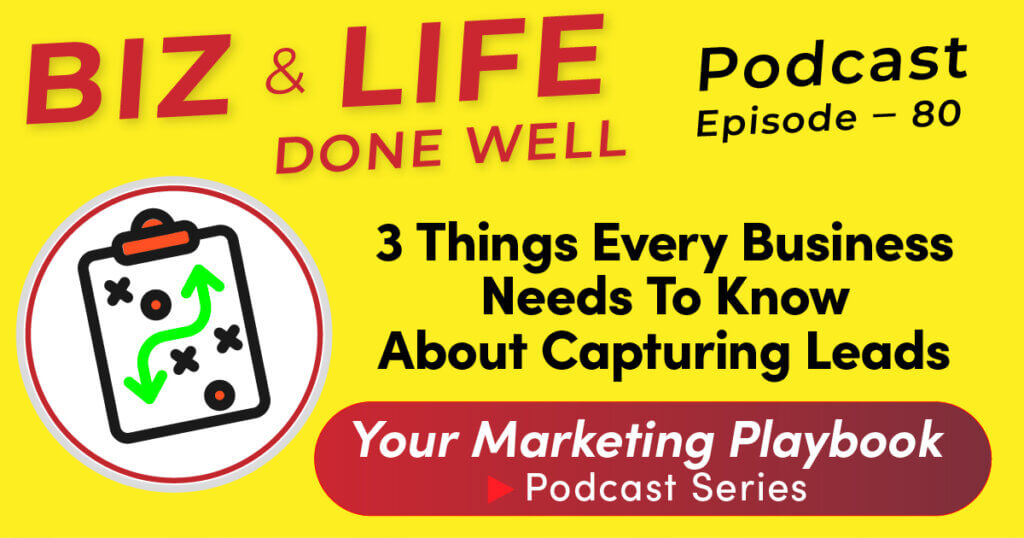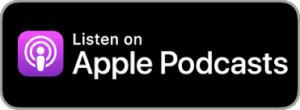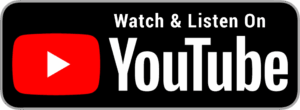Title: 3 Things Every Business Needs To Know About Capturing Leads – **1PMP Series**
Featuring: Peter Wilson
Peter: The one Page Marketing Plan by Alan Dib. Get new customers, make more money, and stand out from the crowd. I’m asking you, why haven’t you gotten this book yet? You must read this book. This is a game changing book about how to market your small business.
As Alan says on the back of this book, Warning, do not read this book if you hate money. He goes on to say, To build successful business, you need to stop doing random acts of marketing and start following a reliable plan for rapid business growth. And he also says, Traditionally, creating a marketing plan has been a difficult and time consuming process, which is why it often doesn’t get done. He’s saying, Hey, let’s plan and then execute against the plan. If you can fit it onto one page, there are many benefits to that.
Welcome to the Biz and Life Done Well podcast, where we explore what it means and what it takes to do business and life well. I’m your host, Peter Wilson. If you’re like me, you’re intrigued by stories of common people who have achieved uncommon success in business and life. Join me as I interview fascinating people about how they got started, their successes and failures, their habits and routines, and what inspires them. We are going through chapter four now in the one Page Marketing Plan, which is in the during phase, which is after a prospect has heard about you.
There are three phases to the marketing plan. There’s the before phase, Alan calls that act one, which is before your prospective customer knows who you are. Those steps in that phase are selecting your target market, crafting your message, and then reaching your prospects with advertising. So today we’re on the during phase. So they may have seen your ad or seen your truck driving around or seen your sign or seen something else about your business.
They’re now aware of you. And so now we’re talking about capturing leads, which is the first part of the during phase. So they know who you are, but they’re not your customer yet. Let’s talk about capturing leads. One of the things Alan really stresses is not necessarily thinking that every single person that’s going to contact your business is ready to buy today.
If you have that mentality where you only want to talk to people who are ready to buy today, you are really limiting the amount of potential customers for your business. He’s got a chart in the book that really blew me away. He points out that if you were surveying a market for folks for a consumer product, for example, on any given day, 3% of the folks out there might be ready to buy today. You take your addressable market. For example, let’s say your target market is families that are looking for a new dentist.
If you take a 100 people, a 100 families out there and you survey them, maybe 3% would be looking for a new dentist now and they’re ready to book an appointment. Seven or 7% are open to booking an appointment, but they’re not necessarily ready, but they’re very open to it. Just a small fraction of the people are either ready to buy or ready to book or open to it. The next portion of folks that he points out, folks that are interested, but not right now. That’s 30% of the market.
And then he goes on to say 30% are not interested. Just no, not interested. And then another 30% would not even take it if it was free. So clearly 60% of your addressable market, they’re either not interested at all, or they wouldn’t take it even if it were free. We should be focusing on this 40% who are either ready to buy, very open to buying or interested, but not right now.
And the folks that we can really make a difference in the business bottom line are those folks that are interested, but not right now. Now, if you’re running a marketing program, you want to get those people that are ready to buy right now and the people who are very open to buying. But three times, three X that are folks that are interested, but not right now. And obviously this is a generalization, but it illustrates a great point when you’re putting your marketing plans together. Are you just looking for folks that want to raise their hand today and buy from you?
I know a lot of businesses do that and it’s natural because we to pay our payroll, we have to pay our rent, got mortgages to pay, we’ve got all sorts of things that are needing money today. But what Alan talks about is actually having the mentality of a farmer rather than a hunter. What does a hunter do? A hunter goes out each morning, captures something to eat, drags it home, cooks it up, and what happens? The next day, they got to get up and do the very same thing.
So if you just have this really short term mentality, you spend a lot of resources surviving day to day. So if you take the time to farm, and in this case, we’re talking about is focusing on those folks who are interested, but not right now. So we call those folks prospects or prospective customers. So what we want to do is capture leads from them. We want to get their information and get permission from them to market to them over time.
Now there’s a variety of ways we can do that. What we do now in the last episode we talked about running ads, for example. So this is a great way to get your name out in front of people. But if you’re just running ads get your name in front of people, then you’re probably going to fail because you do have to have a reason for them to contact you or a reason for them to click on the ad and a reason for them to pay attention. So we’ve established that it’s important to look at marketing as a farming exercise where you are focusing on folks that are not just ready to buy today, but also folks who are interested but not necessarily ready today.
So as a business owner, what do you do about that? So Alan Dib talks about mining for gold with the ethical bribe. The ethical bribe means that we are giving a prospective customer something of value. And generally what we’re doing is we’re going to gather their email address, their phone number, maybe their zip code and their name. And in exchange for them giving us that information, we’re going to give them some things.
That would be, sometimes it’s a downloadable piece of content. It could be access to a video. It could be a webinar. So here are some examples that I put together here for different businesses. So for example, if you’re an estate planning lawyer, you could have the ultimate estate planning guide, secure your family’s future today.
It could just be an ebook, so to speak, or a PDF describing the different aspects of estate planning and why you’d want to do that. You’re not actually doing it or providing any legal advice. You’re just explaining the value of doing that and kind of the nuts and bolts of how that works. For a dental practice, they could offer bright smile secrets, top 10 tips for maintaining dental health. CPAs could offer tax tips for small businesses, how to maximize your returns, could be a white paper.
Again, you’re not necessarily going to be offering tax advice. You’d make that clear. You could just talk generally about some strategies. Roofing contractor could put out a roof care 101, a homeowner’s guide to roof maintenance and repair. Just some things to look for in terms of science of roof damage and when to call a professional.
Home remodeler could put out a dream home on a budget. Transforming your space without breaking the bank. For example, that could be a webinar or it could be a PDF. Probably be better to do that as a webinar. A residential electrician, they could put out a complete home electrical safety checklist and it would be a checklist on how homeowners can maintain a safe electrical system and when they should be seeking help.
Chiropractor, Back to Basics, a five day email course about preventing back pain. Auto repair, auto maintenance masterclass, prolonging your vehicle’s lifespan. And it could be a series of short videos about basic car maintenance tasks and what you need to have done at what time. Commercial landscaping company could have one called the green business. How beautiful landscaping can boost your brand.
Residential Pest Control Bug Proof Your Home A Comprehensive Guide to Pest Free Living An HVAC company that’s heating and air Stay cool and warm all year Your Ultimate Guide to HVAC Maintenance You could have a residential painting company, Color Your World, Choosing the Perfect Paint Palette for Your Home. That could actually be a consultation as well, or a basic guide that talks about different colors and finishes. An IT company, Cybersecurity one hundred one, protecting your business from digital threats and mobile auto detailing, car care tips, keeping your vehicle looking brand new. It could be a tip sheet that you would download on how to keep your car clean between professional detailing. Those are just some examples of what we call lead magnets.
And the way that you offer these is you have an ad that you’re running, and then it goes to your website, goes to a landing page where you collect the information for the prospect that’s landing there. And then you, of course, you want to send them this information right away. You’ve given them something of value. They’ve shown an interest by the topic they’re responding to. They’ve indicated to you that this is of interest to them, and then we want all of these to be all the email addresses and all the information you collect, the names, phone numbers to go into some type of database, which is typically a CRM tool.
Things like Mailchimp, as I mentioned earlier, have that built in so you can rely on that to keep your prospects organized. I do want to talk about a couple advanced techniques that you can use to capture additional leads from your website. So if you’ve got traffic on your website, you may not even know where it’s coming from. Could be organic traffic coming from Google, Could be ads that you’re running. People who have come to your site, they may or may not decide to download something because they may just not have been interested.
They might’ve even seen it when they first visited your website. Well, we can use remarketing ads. The ads that follow you around after you visit a website, and we can actually advertise your lead magnets as well. If you’re a CPA and somebody comes to your site, you could have ads for tax tips for small businesses, how to maximize your returns as a downloadable white paper that would be shown to them after they come to your website. It’s going to reinforce your brand, show you as an expert in that area because of the topic that you’re talking about and offer them something to download as well.
So it’s really a way to kind of double down on folks who do visit your website and capture even more leads. We highly recommend that. Next week, we’re going to talk about nurturing leads. Once you’ve captured the leads, now what do we do? Next week, we’re going to talk about what you do with them.
Until then, have a great week. See you soon. Thanks for listening to this episode of Biz and Life Done Well with Peter Wilson. You can subscribe to us on iTunes, Google Podcasts, Spotify, and most of the other popular podcast platforms. Please tell your friends about us and leave us a review so even more people will find out about us.
Thanks again. We’ll see you soon.



